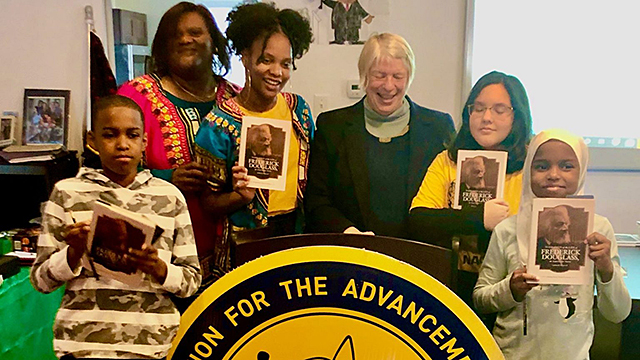
As a representative of the Willits Book Trust Committee, a grantmaking group of Philadelphia Yearly Meeting, Lisa Stewart Garrison, a member of Greenwich Friends Meeting in Salem Quarter, was invited to take part in a community reading of Frederick Douglass’ “4th of July Speech” sponsored by the National Park Service and the Underground Railroad Network to Freedom.
A video of the speech, which launched online on July 4th, 2020, can be listened to in its entirety on the National Park Service website. PYM’s participation in the reading can be found at 1:14:20.
The searing oratory of Douglass’ words, as expressed through many poignant voices, addresses the moral crisis of slavery and rings true through the ages, cutting through hypocrisy in ways that are wholely relevant to our struggles for racial justice today. The participant readers represent different ethnicities, ages and backgrounds, and their voices combine to form a genuine American tableau of scholars, park rangers, museum interpreters, church members, historians, students, and cultural, spiritual, academic and government leaders.
PYM’s Willits Book Trust Committee presents books as a way of honoring a range of organizations and individuals, each of them notable for the distinguished ways in which they serve African American communities today. To leverage publicity for the recipients, Willits Book Trust Committee members travel to sites to present the books as part of educational programs, conferences, or special events.
The books–primarily ordered through FGC’s quakerbooks.org–embody Quaker values and concerns such as the story of the Underground Railroad, peace, and the ongoing struggle for racial justice. A classic work detailing the City of Philadelphia’s extensive abolitionist activities, The Underground Railroad by William Still, has been presented to groups that include the Penn Center on St. Helena Island, North Carolina, and the John Hope Franklin Center for Reconciliation in Tulsa, Oklahoma.
A representative sampling of other Willits Book Trust recipient organizations includes:
• The Percy Griffin Community Center in Davant and The African American Museum in St. Martinsville, Louisiana;
• The St. Augustine Civil Rights Museum in St. Augustine, Florida;
• The Harriet Tubman Visitor Center in Cambridge, Maryland;
• Cuttington University in The Country of Liberia; and
• The Bridgeton Municipal Youth-to-Youth Alliance in Cumberland County, New Jersey.
The Willits Book Trust Committee is no stranger to Frederick Douglass and his eloquent message of freedom and justice. Lisa Stewart Garrison has developed a well-received program for young people that raises awareness of Frederick Douglass’ character and leadership by comparing his thoughts and deeds in the 19th century to those of Martin Luther King in the 20th.
Through Willits Book Trust Committee’s involvement in One Million Abolitionists, a Frederick Douglass Family Initiative launched in 2018, the Quaker grantmaking group has presented hundreds of copies of Douglass’ Narrative of an American Slave to young readers in Southern New Jersey. In fact, the grantmaking group’s final public book presentation, on February 29th, 2020, recognized members of the Youth Council of the Gloucester County NAACP for involvement in social service projects aimed at bettering their communities.
Small but mighty, the Willits Book Trust Committee has helped launch libraries, provided support for authors, and honored scores of individuals for their cultural leadership and activism. In raising the profile of others through a spiritual witness in the world, Willits continues to cultivate friendships on behalf of Philadelphia Yearly Meeting, contributing to an unbroken line of Quaker activism, alliance and support that extends through movements that include abolition, Civil Rights, and Black Lives Matter.
“Taking part in this community reading of Douglass’ speech was our honor and pleasure” Garrison explained “and Douglass’ words have power. My challenge and hope going forward will be to live up to them.”
Watch a video of the community reading of Frederick Douglass’s “What to the Slave is the Fourth of July?”